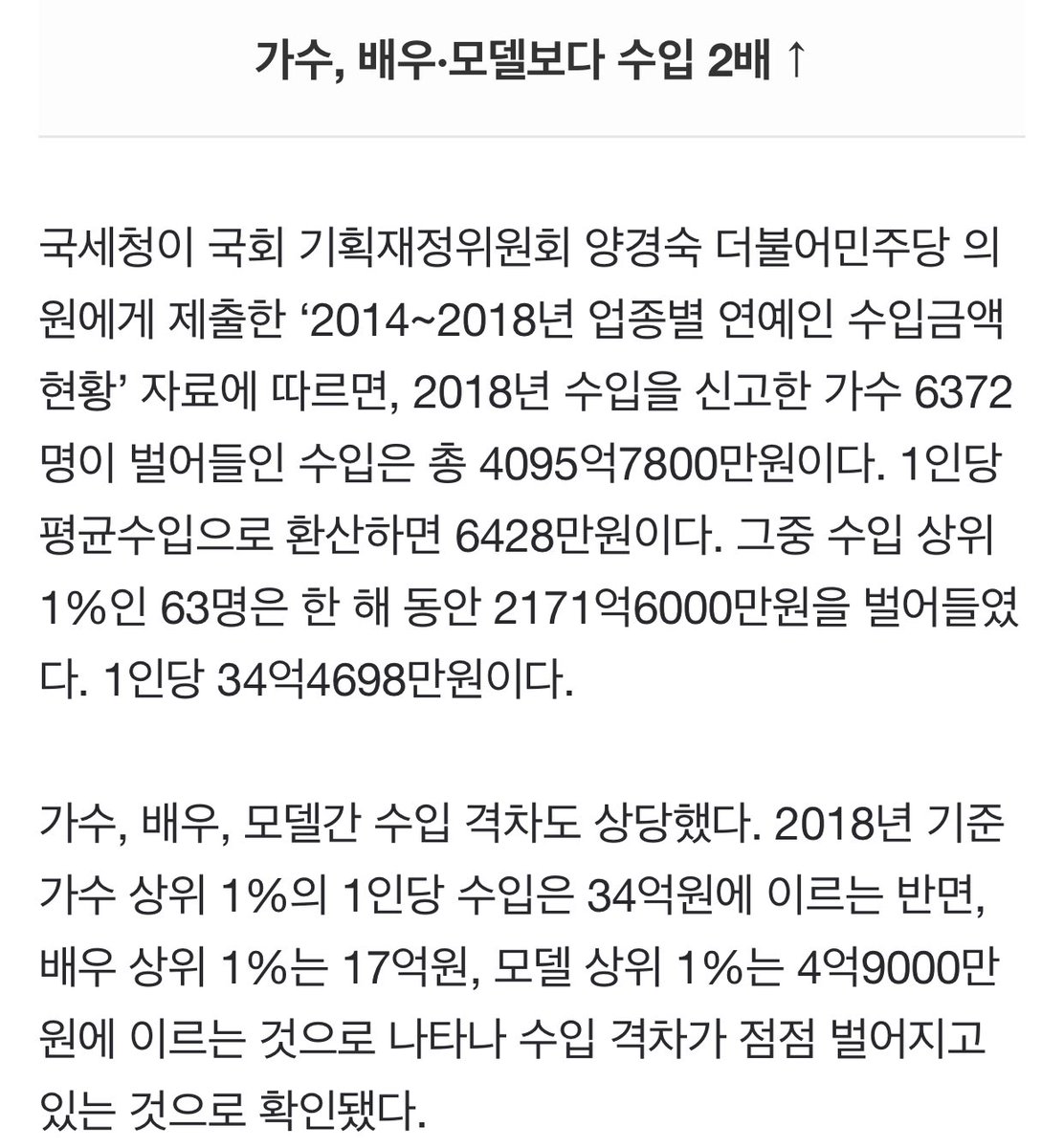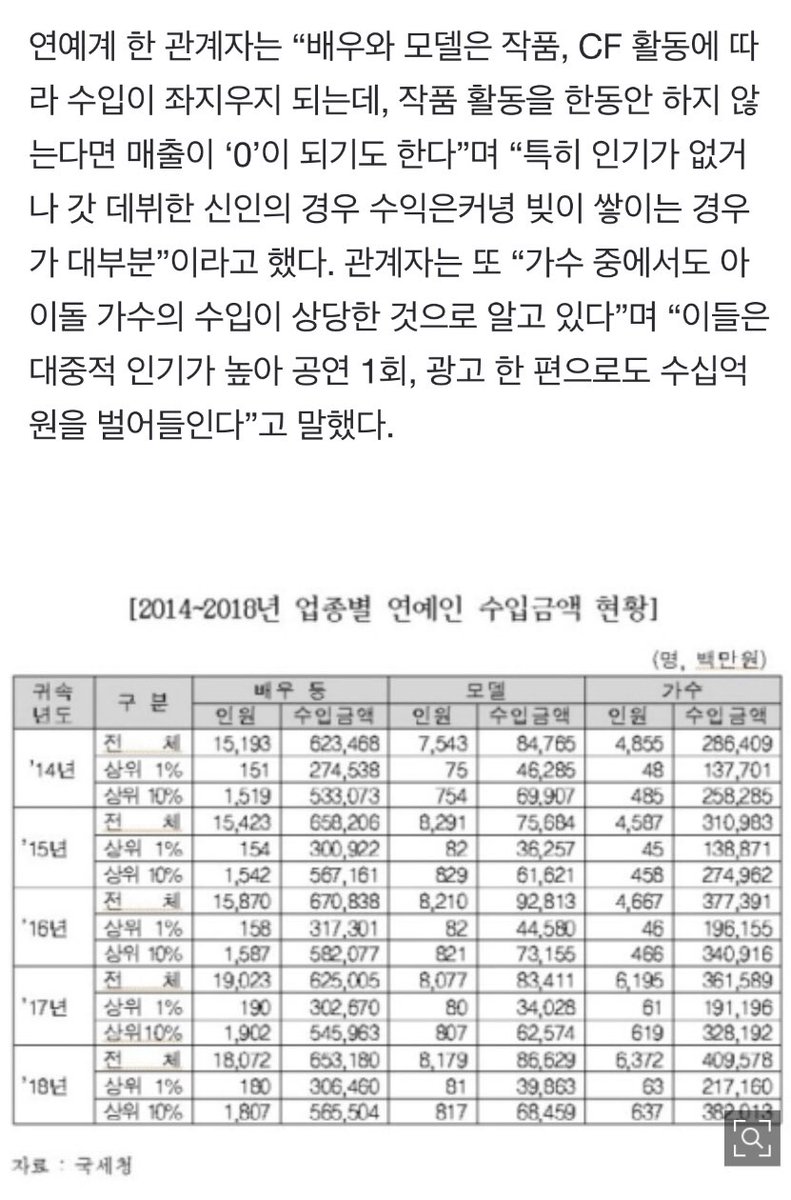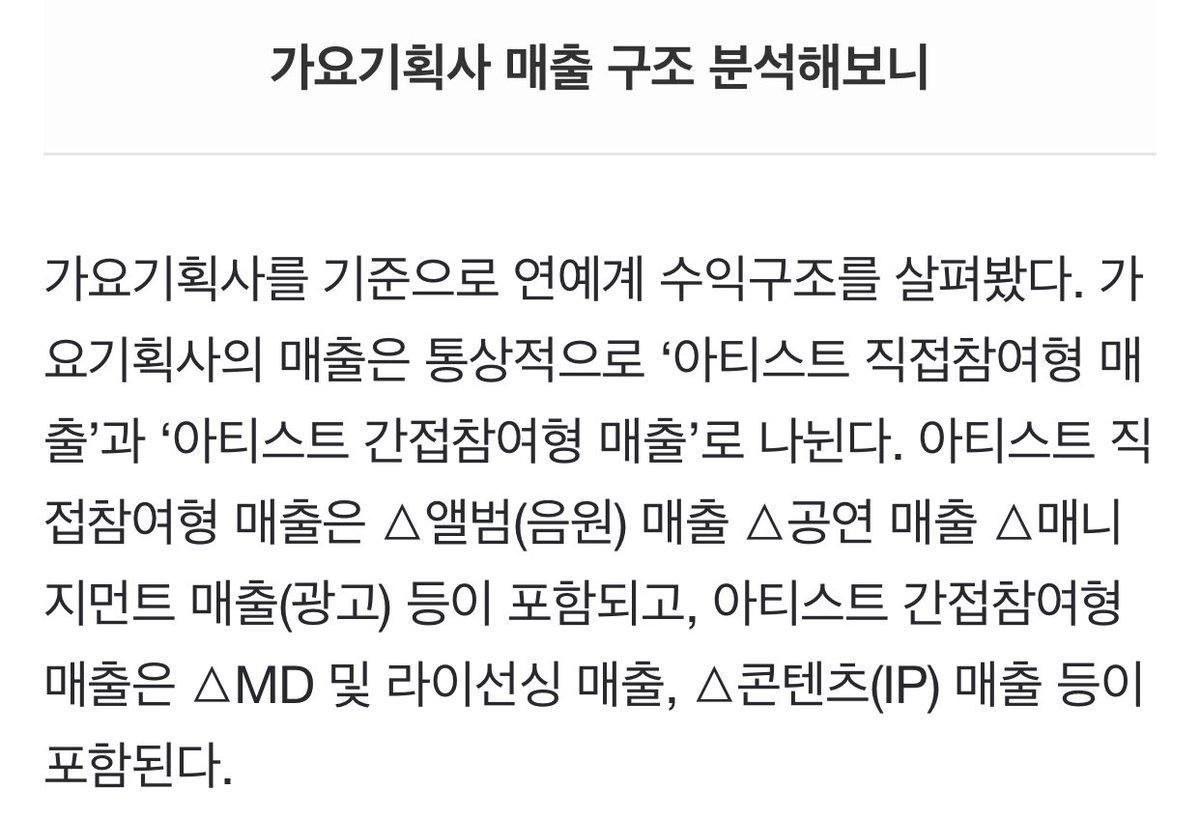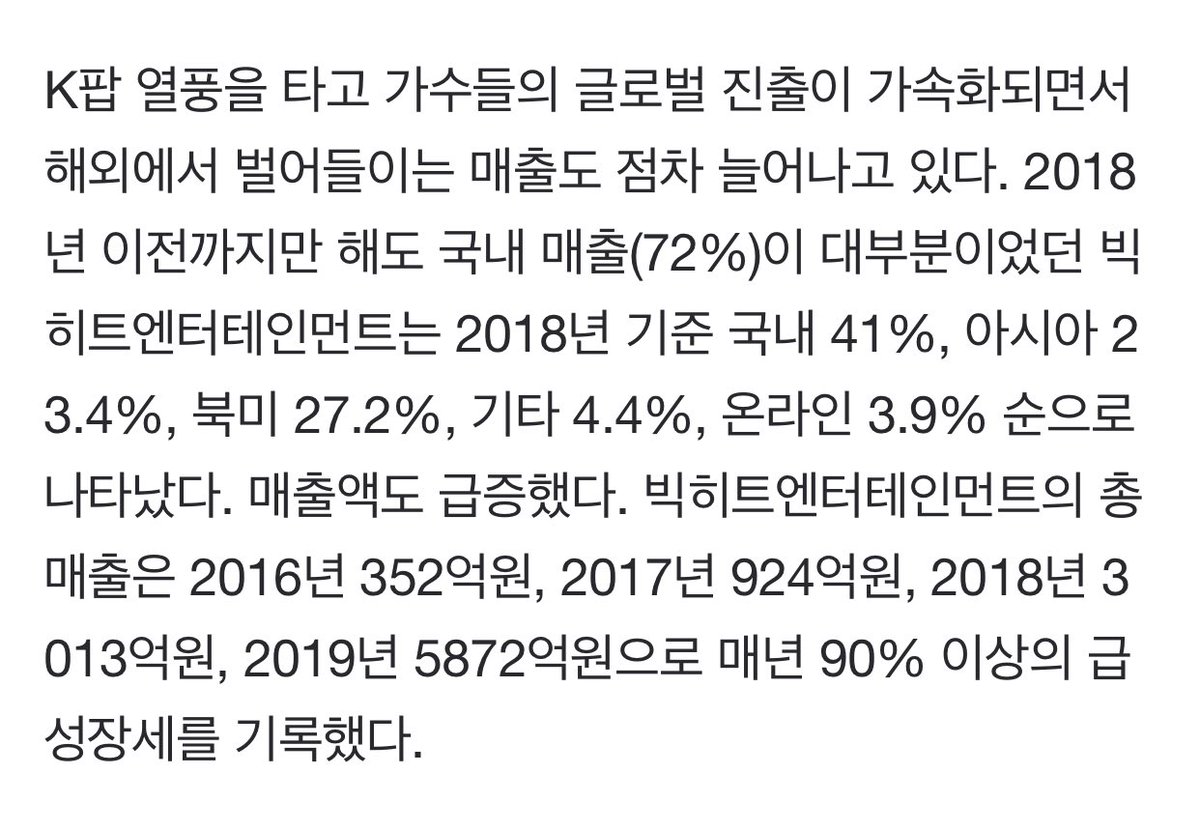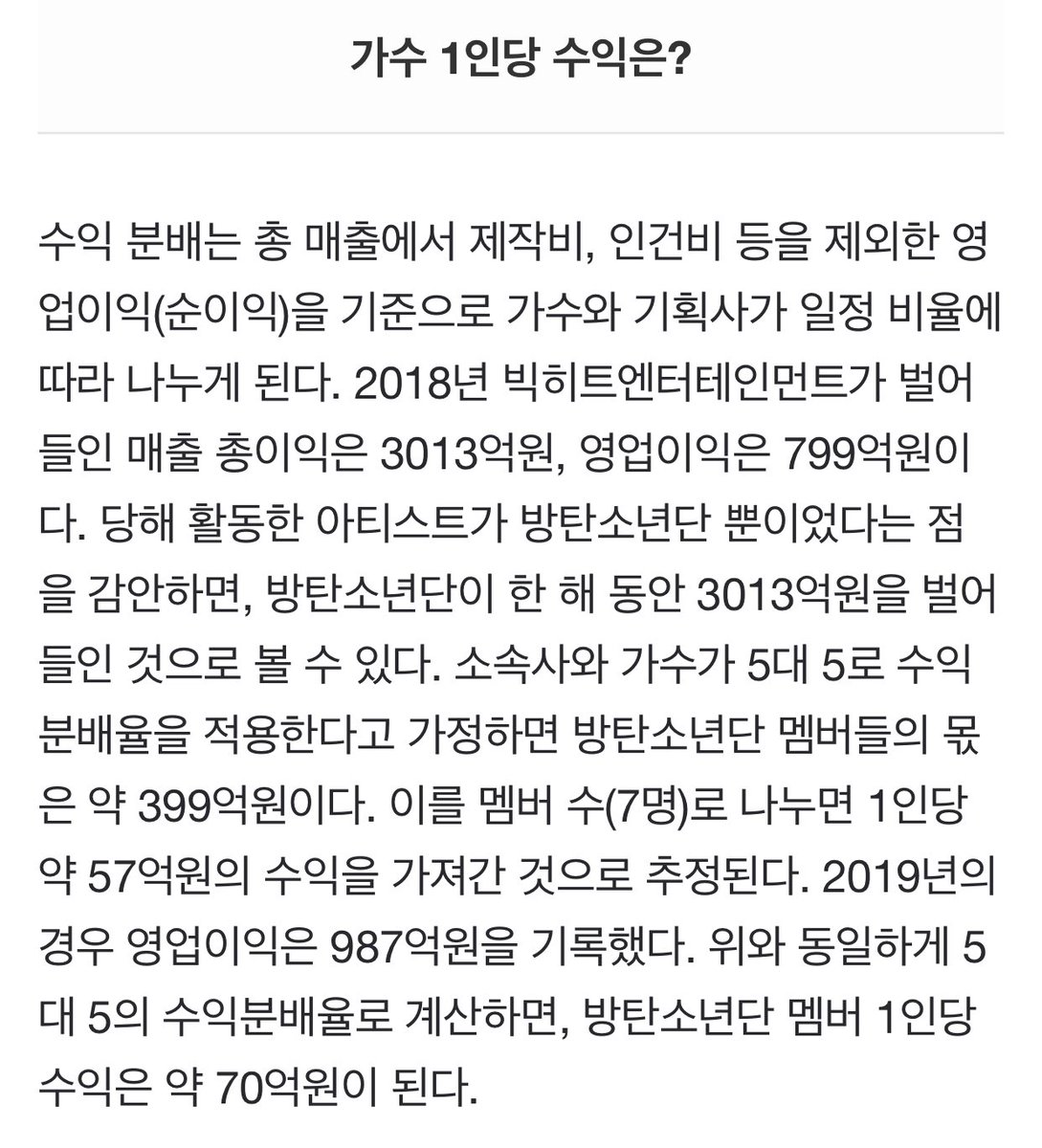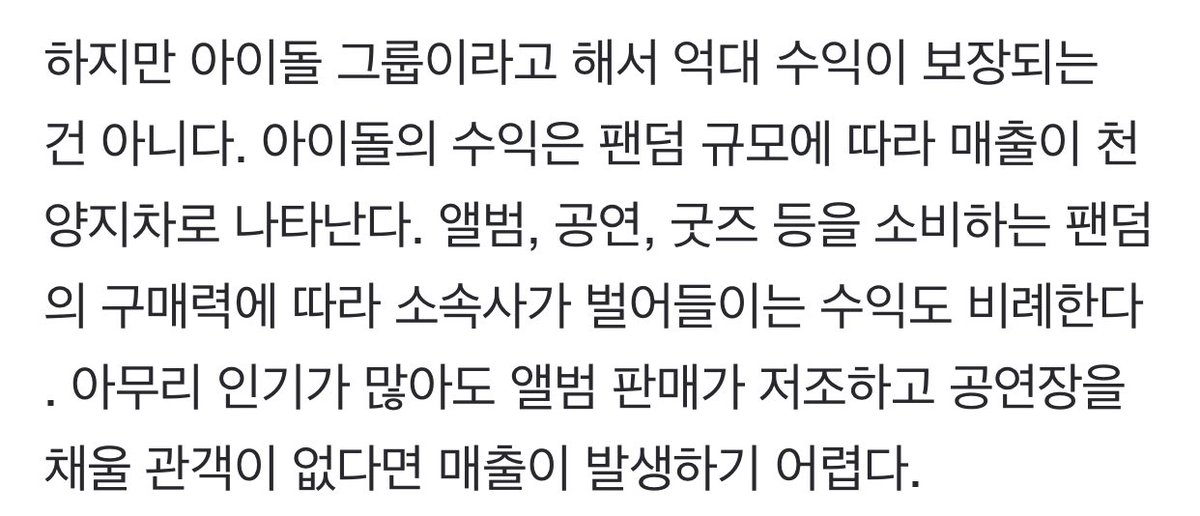“Top 1% of singers annual income is $3M...analyzing idols’ income”
$3M is the avg income a singer in the top 1% earned in 2018. A singer in the bottom 99% earned $57k. It’s proof that the polarization of celebrity income is serious. One industry source said, “Entertainers are +
$3M is the avg income a singer in the top 1% earned in 2018. A singer in the bottom 99% earned $57k. It’s proof that the polarization of celebrity income is serious. One industry source said, “Entertainers are +
like temporary workers; there’s probably an even bigger gap when you compare income during active & inactive periods.”
• Singers’ income is more than 2x than actors•models
Acc to 2014-2018 data submitted by the National Tax Service to Democratic Party member Yang Kyungsook, +
• Singers’ income is more than 2x than actors•models
Acc to 2014-2018 data submitted by the National Tax Service to Democratic Party member Yang Kyungsook, +
in 2018, the total income from 6372 singers‘ earnings was $363.1M, so avg income per singer is $57k. 63 of the 6372 were the top 1%; their earnings totaled $192.5M for an avg of $3M per person.
The income gap btwn singers, actors & models is also quite large. Based on 2018 data+
The income gap btwn singers, actors & models is also quite large. Based on 2018 data+
the avg amount a person in the top 1% of singers earned $3M, of actors = $1.5M, of models = $434k. And the gap is getting larger and larger.
One ent industry source said, “The incomes of actors & models depend on how much work & CF activities they have, and when they don’t have+
One ent industry source said, “The incomes of actors & models depend on how much work & CF activities they have, and when they don’t have+
any work for awhile, their incomes are basically zero. If you’re not popular or a rookie, you accrue a lot of debt, much less earn an income. I also know that among singers, idols earn the most since they are popular and earn a lot from even just one performance and one ad.” +
• After analyzing Kpop agencies’ revenue structures
Kpop agencies in general categorize their revenue into “artist direct participation revenue,” which includes albums/songs, concerts, ads & “artist indirect participation revenue,” which includes MD/licensing & content (IP). +
Kpop agencies in general categorize their revenue into “artist direct participation revenue,” which includes albums/songs, concerts, ads & “artist indirect participation revenue,” which includes MD/licensing & content (IP). +
Using @BTS_twt’s agency BH as a standard, in 2018, BH reported $266.6M in total revenue. 68.8% = direct part rev & 31.2% = indirect part rev.
A breakdown:
album/song sales = 35%
concerts = 29.1%
MD/IP = 17%
content = 11.1%
BTS earned 2/3 of BH’s revenue w/ albums & concerts. +
A breakdown:
album/song sales = 35%
concerts = 29.1%
MD/IP = 17%
content = 11.1%
BTS earned 2/3 of BH’s revenue w/ albums & concerts. +
More singers are going overseas more bc of kpop’s increased popularity, so sales from overseas have gradually been increasing. Before 2018, BH’s domestic sales accounted for 72%. But in 2018, the breakdown was 41% from Korea, 27.2% NAmerica, 4.4% other countries & 3.9% online.+
Their revenues also surged. BH’s total revenue increased more than 90% every year:
2016: $31.18M
2017: $81.84M
2018: $266.6M
2019: $520.11M
• Revenue per singer?
Profits are divided btwn the singer & agency based on their contract using the operating profit, which is +
2016: $31.18M
2017: $81.84M
2018: $266.6M
2019: $520.11M
• Revenue per singer?
Profits are divided btwn the singer & agency based on their contract using the operating profit, which is +
the total revenue excluding expenses like production & labor costs. In 2018, BH posted $266.6M in total revenue and $70.7M in operating profit. Considering @BTS_twt was their only active artist that worked that yr, it’s inferred that BTS earned $266.6M. Assuming BH & BTS have a +
profit-sharing ratio of 5:5, then the 7 @BTS_twt members earned $35.3M or $5.04M per member. In 2019, BH’s operating profit was $87.31M so after applying the same 5:5 ratio, each member earned $6.24M. +
Each agency uses a different profit-sharing ratio. If the artist’s rate is higher, then income per capita will increase proportionally. In @BTS_twt’s case, it’s estimated that after their contract renewal in 2018, their profit-sharing ratio is more than 7 (BTS): 3 (BH).
However idol groups don’t guarantee big profits. The revenue of idols varies depending on the fandom size. The agency’s profits are proportional to the fandom’s purchasing power of albums, concerts, goods etc. No matter how popular an idol is, +
if album sales are low & venues aren’t full, it’s difficult to generate revenue.
For ex, an idol group of a large ent company described as “a next generation leader of Kpop” recently held a virtual concert, but ended up losing money bc they failed to have even 10k viewers. +
For ex, an idol group of a large ent company described as “a next generation leader of Kpop” recently held a virtual concert, but ended up losing money bc they failed to have even 10k viewers. +
Industry insiders analyzed that despite being popular with the general public, their fandom size isn’t large so they don’t have enough fans who consume paid content which led to a deficit. A source from a Kpop agency said, “In the case of idols, fandoms are very concentrated. +
Big fandoms are mainly found at big agencies. Since profits vary based on the popularity [of the idol groups], the trend of ‘the rich are getting richer and the poorer are getting poorer’ in idol groups is deepening.”
That was long https://abs.twimg.com/emoji/v2/... draggable="false" alt="😅" title="Lächelndes Gesicht mit offenem Mund und Angstschweiß" aria-label="Emoji: Lächelndes Gesicht mit offenem Mund und Angstschweiß">
https://abs.twimg.com/emoji/v2/... draggable="false" alt="😅" title="Lächelndes Gesicht mit offenem Mund und Angstschweiß" aria-label="Emoji: Lächelndes Gesicht mit offenem Mund und Angstschweiß">
https://n.news.naver.com/article/018/0004773291">https://n.news.naver.com/article/0...
That was long
https://n.news.naver.com/article/018/0004773291">https://n.news.naver.com/article/0...

 Read on Twitter
Read on Twitter
